
THE VOICE OF INTERNATIONAL LITHUANIA
|
VilNews has its own Google archive! Type a word in the above search box to find any article.
You can also follow us on Facebook. We have two different pages. Click to open and join.
|
Archive for July, 2011
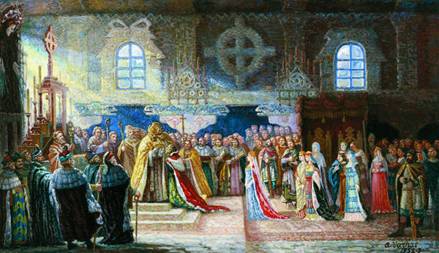
Coronation of King Mindaugas (Adomas Varnas, 1952 m.)
6 July is Lithuania’s State Day and a national holiday. On this day, Lithuanians honour the coronation of Mindaugas, who became the first and only king of a unified Lithuania in 1253.
By Tomas Venclova, historian
The first Lithuanian ruler, Mindaugas (ca. 1200 – fall 1263), is wreathed in mystery and ambiguity―almost as much as St. Christopher on Vilnius’ coat of arms. His rise occurred at a time when Lithuania first confronted the German knights, the so-called Knights of the Teutonic Order. Like most founders and unifiers of nations, Mindaugas probably was not a very attractive character. He did away with the majority of his opponents (among them, quite a few of his relatives), adopted Christianity, was crowned King by the Pope, but then broke with Christianity after his wife’s death―in any case, that is what the Teutonic Knights claimed. His wife’s sister, who was married to Grand Duke Daumantas, came to the funeral. According to the story, “The king shamelessly violated the law, robbing the woman of her honor by force and keeping her as his wedded wife.” Daumantas killed Mindaugas and fled to the Russian city of Pskov, where he adopted the Orthodox Christian faith. He became a famous ruler and was later canonized. Meanwhile, for a good half-century the Lithuanian state disappeared from history: what happened during this time is beyond reliable historical knowledge.
What is clear is that there were no longer any kings, only grand dukes. (After the First World War an attempt was made to restore the old monarchy. When the German Prince von Urach was called to the throne, he intended to call himself Mindaugas II. But the idea never went beyond this operetta-like plan.) Historians, relying less on documents than on patriotism, have been trying to prove that the story of Mindaugas is connected with Vilnius: he was said to have been crowned and murdered in this settlement. In any case, he is credited with having built the first cathedral, whose Romanesque ruins can be found in the vaulted cellars of the present-day Cathedral. When Daumantas took revenge against Mindaugas, they say, the cathedral again became a pagan place of worship. Ardent supporters of this tale have even found twelve stone steps and the sacrificial altar of the cult site.
Admittedly, like most stories from that period, this one has a touch of the absurd. Still, Mindaugas became the symbol of the threatened state. Not long ago, a memorial to him was erected at the mouth of the Vilnia. A somewhat naïve play* portrays him as the first Lithuanian patriot. It influenced the generation that subsequently took to the barricades for the liberation of the country from Communism. Nevertheless, the true founder of the city was not Mindaugas, but Gediminas, a ruler who came to power after this “blank” period in the history of Vilnius.
- Bookmark :
- Digg
- del.icio.us
- Stumbleupon
- Redit it

IRVING, Texas, Jul 05, 2011 (BUSINESS WIRE) -- Fluor Corporation announced today that it has been awarded a contract by Klaipedos Nafta AB, Lithuania's state-owned oil company, to provide engineering and business support services for a new floating liquefied natural gas (LNG) import terminal in Klaipeda, Lithuania. Fluor booked the undisclosed contract value in the second quarter of 2011.
Under the contract, Fluor will provide Klaipedos Nafta with engineering, technical, risk management, safety and environmental advisory services. As the lead advisor, Fluor will prepare the technical development plan and assist in selecting technologies, as well as developing a business plan for the terminal.
"Fluor is pleased to serve as an advisor to Klaipedos Nafta's development phase for a new LNG terminal in Klaipeda," said Peter Oosterveer, president of Fluor's Energy & Chemicals Group. "This is another sign of growth in the LNG market and the growing importance of that development in the Baltic region."
"We selected Fluor as the lead advisor due to their having the best experience, optimal work execution and price, and we are pleased with the fact that negotiations were completed successfully and in a timely manner," said Rokas Masiulis, general manager of SC Klaipedos Nafta.
Fluor has previous experience in Lithuania as the engineering, procurement and construction contractor for the Butinge Oil Terminal Project for Mazeikui Nafta in Butinge, Lithuania, in 1999. In the early 1990s, Fluor conducted a feasibility study and developed siting plans for Lithuania's Energy Ministry for the expansion of its Klaipeda oil terminal.
Klaipedos Nafta operates the oil terminal in the city of Klaipeda, which is located on a Baltic Sea port and is part of a key shipping route for Eastern Europe.
About Klaipedos Nafta

Klaipedos Nafta owns and operates one of the most modern crude oil and crude oil products terminals in Europe. It operates in the ice-free port of Klaipeda, a major Lithuanian transport junction connecting sea routes, motorways and railways between the East and West. Klaipedos Nafta is currently in the process of building the first LNG import terminal on the Eastern Baltic Sea shore with an initial LNG import capacity between 2.2 to 3 billion m3. For more information, visit www.oil.lt
About Fluor Corporation

Fluor Corporation designs, builds and maintains many of the world's most challenging and complex projects. Through its global network of offices on six continents, the company provides comprehensive capabilities and world-class expertise in the fields of engineering, procurement, construction, commissioning, operations, maintenance and project management. Headquartered in Irving, Texas, Fluor is a FORTUNE 200 company and had revenue of $20.8 billion in 2010. For more information, visit www.fluor.com .
SOURCE: Fluor Corporation
PRESS RELEASE FROM:
http://www.businesswire.com
- Bookmark :
- Digg
- del.icio.us
- Stumbleupon
- Redit it
![]() Article ref:
Article ref:
https://vilnews.com/?p=6704

REGINA NARUSIENE: “The majority, I believe, are disappointed and discouraged with the present president’s seemingly unfriendly view toward Lithuanian-Americans and others abroad.”
* * *
The above article was published in VilNews 18 June. I added, by then, the following comment to the article:
|
Around half of all Lithuanians in the world live outside their home country. They represent a human resource Lithuania desperately needs to get the country back on its feet again after 50 years of bloody wars, genocides, deportations, Soviet opression and now two decades with much muddle and confusion instead of professional focus on collaboration and team work among its own populations here and abroad. - Aage Myhre, Editor-in-Chief |
And here is what US-Lithuanian Joe Barlow says in his today’s comment:
The majority of people I speak with have no interest in doing anything, because of the unwelcome feeling or worries of being taken advantage of and wondering if they will get any kind of return on investment or just watch it all go down the drain

I could not agree more with Aage, this is long overdue coming and there are enough people outside of Lithuania that have the means, Education, Business expertise, Etc... that would only help our country and everyone involved or connected to it.
Keeping all the diaspora at bay and not welcoming such people seems such a waste, when together all as a whole we can make things better, in all aspects; Economy, Banking, Education, Investments in companies the list goes on...
The majority of people I speak with have no interest in doing anything, because of the unwelcome feeling or worries of being taken advantage of and wondering if they will get any kind of return on investment or just watch it all go down the drain.
There is no bottom to this well of people from all different fields and many experts, but this well will dry up and soon another generation will pass and there will be more and more less interest in knowing our homeland and trying to keep it a strong vibrant economically sound country, one we can all be proud of and one many still are of.
Joe Barlow
- Bookmark :
- Digg
- del.icio.us
- Stumbleupon
- Redit it
- Posted by - (0) Comment
WORLD LITHUANIAN ECONOMIC FORUM
VILNIUS, 4-5 JULY:

A successful event, but
will it create any ripple effects?
The World Lithuanian Economic Forum (WLEF) is still in full swing as I write this. So I should be careful about drawing too many conclusions yet. What I have seen so far, is an event where some 400 people meet to discuss what more can be done to collect Lithuanians from all over the world to joint efforts for their fatherland. More investments, more engagement is being requested. The mood is good, the speeches and discussions as well. Yet I can not help but wonder why only about 100 of the 400 attendees are foreign-Lithuanians. Nearly half of all who call themselves Lithuanians live, after all, far from their country of origin, and they should constitute a very significant resource for further development of this nation.
It was also remarkably few business people represented, as a percentage of the number of participants, hence the business-to-business impact can hardly have been very large.
Yet it is my conviction that this is an event that has a future, and I hope to see WLEF in Vilnius also next summer.
These are mythree suggestionson how tofurtherdevelop and enhance the event:
1. MORE BUSINESS-TO-BUSINESS
The president, government, organizations and businesses should work together to make WLEF even more business-oriented, to invite and prepare for specific interaction activities between local and international companies. Local organizations and their sister organizations in other countries, like Rotary Clubs, should be integral parts of the event, planning well in advance for face-to-face meetings at the event.
2. A PERMANENT, YEAR-ROUND OPERATION
ICC, together with other organizations, should establish a permanent secretariat, with state support, for a year-round operation of the kind of activities that should appear in each year's WLEF summer event.
3. AN EVEN BROADER FORUM – FIRST WEEK OF JULY EVERY YEAR
The WLEF forum should become an annual tradition, going on for a whole week every summer, for example during the first week of July in connection with the celebration of King Mindaugas coronation on 6 July. The event should include several types of activities; within business, culture, festive gatherings, etc. I think this would make more foreign-Lithuanians and their families come to participate. The weaving of contacts would also be improved by more social interaction, and the many who live outside the home land will increasingly feel that they are appreciated and welcomed home!
Aage Myhre, Editor-in-Chief
|
THE OPENING SPEAKERS |
|
|
|
|
|
THE KEY-NOTE SPEAKERS |
|
|
|
|
|
THE ROUND TABLE PANEL DEBATERS |
||
|
|
|
|
|
|
|
|
The round-table debaters had some good points in yesterday's WLEF meeting. The question they all would answer, was what they thought should be done to make Lithuania more progressive and competitive in the future.
EDUCATION, EDUCATION, EDUCATION
"Education, education, education" was David Passig's formula, with reference to statistics showing that there is a clear correlation between education level and economic growth in a country.
Education Minister Steponavicius noted dryly that there still are too many students who are more concerned with getting a diploma than to acquire acquire real knowledge, concluding that the quality level of higher education in Lithuania must be raised. "20 years have given us the time we need to find our place in the context of 'global Lithuania. Now it is high time that we have developed an education reform that works," the Minister stated.
MINISTRY OF TALENT – BRAIN CIRCULATION
Omnitel's President Antanas Zabulis, suggested that the Ministry of Education should perhaps change its name to 'Ministry of Talent' and also mentioned that Lithuania no longer should focus neither on brain drain nor on
brain gain, but on brain circulation.
By virtue of his position he also noted that broadband and other internet Internet solutions are highly essential for a good development of Lithuania. "It is no longer enough to have good ideas, speed is now just as important," he said.
ISM's President, Nerijus Pačėsa, meant that more private universities (as ISM is) would raise the education standard in this country, referring to the fact that the highest graded universities in the U.S. and Japan all are private.
"Also, Lithuania should adopt financing of education through loans, as in Western countries, not leave it all state-financed as is today's situation," he added.
IMPROVED COLLABORATION GOVERNMENT – BUSINESS
Economy Minister Žylius expressed eagerness to improve opportunities for collaboration between government and business. He also said that the
financial tools one now has access to through EU funds, etc. should be applied to the development of mechanisms that promote future developments within the fields of technology, industry, FDIs, etc.
"The government should not tell business what the future will look like, but be a predictable, good facilitator for the business community to see and discover future opportunities," said the Minister.
LET'S BUILD THE BALTIC STATES' LARGEST CONFERENCE CENTRE
Air Baltic's chief in Lithuania, Tadas Vizgirda, referred to some rather gloomy
statistics about tourist traffic into Lithuania. The sad fact is that Latvia has around 5 million visitors per year, while Lithuania, a country with 50% more
inhabitants, is visited by just 1.5 million annually." An enormous potential
that our tourist authorities should no longer ignore, especially considering that every tourist will leave around LTL 600 in tax money," he said, adding that Lithuania would be able to obtain a solid position for professional
travelers if there was invested in building the Baltic States' largest conference centre right here over the next few years.
THE EVENING MUSIC
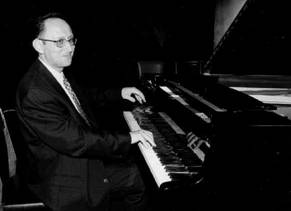
Zecharia Plavin,
a famous Israeli pianist, born in Lithuania, entertained the WLEF delegates
with superb interpetations of Ciurlionis, Liszt and Ravel.
|
THE ORGANISERS |
||
|
|
|
|
ICC Lietuva is organizing the World
Lithuanian Economic Forum (WLEF)
The goal of the World Lithuanian Economic Forum is to draw Lithuanian business people, economists, politicians and scientists from the entire world into Lithuania's economic life, to strengthen their relations with Lithuania, to encourage them to develop business here, to help attract investments to Lithuanian companies and to create a global network of Lithuanians from all the world.
The Forum is organized by the Lithuanian Business Confederation | ICC Lithuania in cooperation with governmental institutions as well as business companies.
The organizers are doing a great job that they deserve very much honour for!
- Bookmark :
- Digg
- del.icio.us
- Stumbleupon
- Redit it
Zecharia Plavin: “One has to play from the heart”
- Posted by - (1) Comment
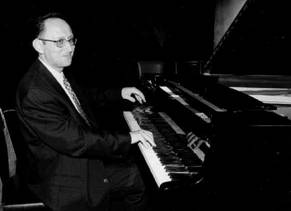
Zecharia Plavin: “One has to play from the heart and in search for the eternal truth, otherwise the music becomes trite”
Beginning his early piano education and performing career under Mrs. Devora Yellin and Prof. Marietta Azizbekova in Lithuania, where he was born in 1956, Zecharia Plavin emigrated to Israel, in 1977. There he continued his musical studies at the Rubin Academy in Tel Aviv under Prof. Victor Derevianko concluding in 1998 with his doctoral research on Ernest Bloch under Prof. Jehoash Hirshberg. A prizewinner of competitions in Lithuania and Israel, amongst them the Shapira Prize of the America-Israel Cultural Foundation in 1980 and the Bachauer Memorial Prize in Belgium, Dr. Plavin has concertized widely throughout Israel, Europe and the United States. Since his first appearance with the Israel Philharmonic Orchestra in 1980 he has performed with most major Israeli orchestras.
His professional credentials are of truly international scope. In addition to his teaching at Bar Ilan University and, for the past ten years as faculty member, at the Rubin Academy of Music and Dance in Jerusalem, Dr. Plavin has given recitals, workshops and master classes in Lithuania; the Hochschule für Musik in Würzburg, Germany; the South Bohemian Music Festival and the Prague Master Classes in the Czech Republic; as well as at the San Diego State University and the Hartt School of Music and in spring of 2001 the University of Illinois.
As a faculty member of the HED Centre of Yehud, his duties included the organization of international seminars of contemporary chamber music. The Center (now located in Tel Aviv) was designed to provide a platform for composers in Israel and, in this capacity Prof. Zecharia Plavin has worked with many distinguished composers including Sir Harrison Birthwistle and Einojuhanni Rautavaara.
His broad knowledge of art, literature and history as well as his profound familiarity with the life and circumstances of the composers of the selected repertoire allows him to bring special qualities to his music making as well as his teaching.
A thoughtful and searching musicality characterizes concerts by this superb musician. In search for the eternal truth in the music, pianist Zecharia Plavin gives another dimension to his performances:
"This is, quite simply, magnetic playing. Combining rhythmic strength with improvisatory fire, structural intuition with tonal finesse, Plavin projects both the intellect and the passion of the music with a conviction that's utterly compelling."
- Prof. Peter J. Rabinowitz, Contributing Editor at Fanfare
“His immersion in the music is so intense that its spiritual content is exposed and turned convincingly into sonorific substance.”
- Benjamin Bar-Am Jerusalem Post
“When Plavin reached the huge climax, after which Liszt inserts, abruptly, a moment of complete silence, I found myself holding my breath”
“Ein überragender Pianist, ein grossartiger Meister seines Fachs, der sich nicht nur mit Schumann ausenandergesetzt, sondern ihn auch verinnerlicht hat.”
- Hannoversche Allgemeine
“His playing is characterized by great taste, intelligence and fantasy. His very accomplished approach to diversified styles is made possible by a very strong technique always at the service of his art, never an end by itself.”
- Prof. Luiz de Moura Castro, The Hartt School
“…the unique quality of Mr. Plavin’s art is his quite uncanny ability to suggest to the listener the idea or experience behind the inspiration of the composer.”
- Concert pianist Michael Wladkowski, Ecole Normale de Musique de Paris
- Bookmark :
- Digg
- del.icio.us
- Stumbleupon
- Redit it
- Posted by - (3) Comment
|
|
Professor David Passig at the ’World Lithuanian Economic Forum (WLEF)’: The dawning of a new civilization
|
“Brain power – knowledge, skills, and human personality quirks – will combine with computer power in order to think, reason, communicate, and create in ways we can scarcely even contemplate today.”
See Professor Passig’s WLEF slideshow here: http://www.passig.com/vault/presentations/TechSingularityEng_Short.pdf

The futurist Ray Kurzweil is one of those Professor Passig refers to when explaining the theory of ‘Singularity’.
In his presentation at the World Lithuanian Economic Forum, Professor Passig also referred to the futurist Ray Kurzweil, who defines the concept of ‘Singularity’ in terms of the technological creation of superintelligence, arguing that it is difficult or impossible for present-day humans to predict what a post-singularity world would be like, due to the difficulty of imagining the intentions and capabilities of superintelligent entities.
Kurzweil believes that we're approaching a moment when computers will become intelligent, and not just intelligent but more intelligent than humans. When that happens, humanity — our bodies, our minds, our civilization — will be completely and irreversibly transformed. He believes that this moment is not only inevitable but imminent.
According to his calculations, the end of human civilization as we know it will take place around year 2045.
The Singularity is an era in which our intelligence will become increasingly nonbiological and trillions of times more powerful than it is today—the dawning of a new civilization that will enable us to transcend our biological limitations and amplify our creativity.
|
Technological singularity refers to the hypothetical future emergence of greater-than human intelligence. Since the capabilities of such an intelligence would be difficult for an unaided human mind to comprehend, the occurrence of technological singularity is seen as an intellectual event horizon, beyond which the future becomes difficult to understand or predict. Nevertheless, proponents of the singularity typically anticipate such an event to precede an "intelligence explosion", wherein superintelligences design successive generations of increasingly powerful minds. The term was coined by science fiction writer Vernor Vinge, who argues that artificial intelligence, human biological enhancement or brain-computer interfaces could be possible causes for the singularity. The concept is popularized by futurists like Ray Kurzweil and widely expected by proponents to occur in the early to mid twenty first century. |
- Bookmark :
- Digg
- del.icio.us
- Stumbleupon
- Redit it

Estonian national carrier announced yesterday that it had decided to close its hub in Vilnius in September and bring its Vilnius-based Boeing 737-500 back to Tallinn.
“We are satisfied with the amount of passengers in Vilnius airport where we achieved more than a 10% market share. Despite high interest, both Vilnius routes are due to significantly increased fuel cost currently losing money, which we cannot accept. 1.5 years ago Lithuania’s aviation market was in a recession - it was wise to enter in a low competitive market, but as for today the competition in Vilnius airport has grown. Considering that the demand in Estonia has increased, it is unnecessary to keep the airplane in Vilnius,” said Rauno Parras, Vice President Commercial of Estonian Air.
The fleet of Estonian Air consists of eight aircraft: two Boeing 737-500, two Boeing 737-300 and two CRJ900 NextGen. Two Saab 340 type airplanes are operated by Estonian Air Regional.
- Bookmark :
- Digg
- del.icio.us
- Stumbleupon
- Redit it
Lithuania’s impressive recovery
- Posted by - (1) Comment
![]()

By Violeta Klyviene - Danske Bank A/S
In the following, we present an updated outlook for the Lithuanian economy, given the latest economic releases for May and June.
In the first quarter of this year, Lithuania demonstrated an impressive recovery: GDP growth accelerated to 6.9% y/y in Q1 11, up from 4.8% y/y in Q4 10. In Q4, the Lithuanian economy was supported by a more notable recovery in domestic demand: final consumption expenditure grew by 4.5% y/y and fixed investment by 41% y/y. The recovery in private consumption is likely to accelerate this year, basically due to a relatively favourable fiscal policy stance. We now expect the Lithuanian economy to grow by 5.8% y/y in 2011E and 4.9% in 2012E.
Lithuanian CPI inflation continued to accelerate, mainly due to a rise in food prices. So far, we see no strong inflationary pressure from the domestic demand side. However, private consumption is growing faster than we predicted and there is a risk that domestic pressure on core inflation could intensify over the second half of this year. We now expect Lithuanian average inflation of 4.7% y/y for 2011 and 3.6% y/y in 2011.
The current account remains in small surplus in 2011, but over the medium term it would swing into a deficit as the trade balance deteriorates further. We forecast that the deficit will remain at a manageable level, but such a trend indicates that competitiveness issues remain relevant.
- Bookmark :
- Digg
- del.icio.us
- Stumbleupon
- Redit it
Lithuania turns its back on us
- Posted by - (0) Comment
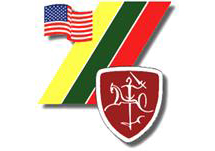
The trick is, what to do about it or, for those of us living outside, why should we be concerned? As life goes on, roots are deepened overseas and Lithuania turns its back on us or makes no effort to either woo back the Diaspora, attract tourists or foreign investment (are these all culturally linked?) an "ace up Lithuania's sleeve" will be lost forever.
To be sure, internally generated progress over the last 20 years has been great and the cultural life, in Vilnius particularly, makes life here in Cleveland, or almost anywhere else I can afford to live, pretty dull.
Lithuania, however, given its precarious geographic position and small population needs to be exceptional in how it organizes itself and how it takes advantage of every scrap of resource (particularly human) that it can.
Rimas Aukstuolis,
Cleveland (American-Lithuanian)
Vice President Structured Trade Finance, Fifth Third Bank
- Bookmark :
- Digg
- del.icio.us
- Stumbleupon
- Redit it
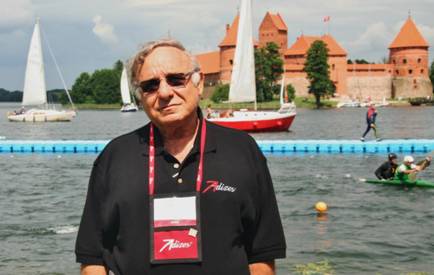
“I am an organisational healer, providing and working with change management for companies, organisations and governments. But not all listen to my advices,” said Dr. Ichak Adizes when we sat down at a lunch table in Trakai Saturday, using the former Serb leader Milosevic and the Greek Government as examples of exactly that.
The annual ‘Adizes International Convention’ took place in Vilnius this weekend. It was the 33rd annual convention for the global organisation that Dr. Adizes started three decades ago. And on Saturday all the convention delegates from around the world were bussed to Trakai for an ‘almost self-baked lunch’, a visit to the castle; plus a little glimpse into the past of the Karaim people who came to Trakai from Crimea 600 years ago, still today representing a huge surprise to most visitors meeting these colourful, Turkic people in far north Lithuania.
My conversation with Dr. Adizes this Saturday afternoon was rather brief and superficial. There were simply too many people and too much noise around us. I will therefore leave it up to his own articles/blogs (below) to speak for him this time.
We did, however, get the opportunity to touch several aspects of what he has experienced during his long life as a consultant and advisor for businesses, organizations and governments around the world. His story about his talks with Milosevic in 1991 follows below.
The fact that his advice to the Greek government, about 20 years ago, regarding the country's way to plan their finances, were not listened to or followed, is a topic we will try to return to at a later date. Just sad to see how much it now costs the country to have been bad listeners when it still was plenty of time to choose another course...
Maybe it’s time now for Lithuania to seek professional advice?
Aage Myhre, Editor-in-Chief
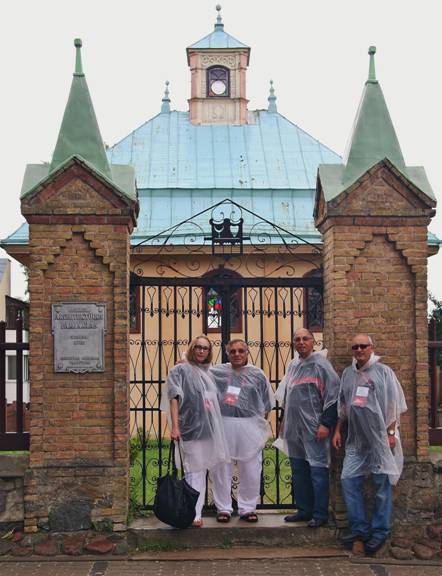
Nurit and Ichak Adizes, Shimon M. Rojany and Gad Mizrahi from the global Adezis organisation were all deeply impressed by the story about the Trakai Karaims. Here in front of the Karaim temple in Trakai, the ‘Kenasa’.
Dr. Ichak Adezis
Dr, Ichak Adizes was born in Skopje, Macedonia, the 22nd of October 1937. In 1948, his family moved to Israel, where he completed his undergraduate studies. In addition to attending college, he also applied for the army.
Dr. Adizes has a Ph.D. and M.B.A. from Columbia University and a B.A. from Hebrew University. He works in English, Spanish, Hebrew, Serbian, Croatian, Bosnian and Macedonian languages.
His works are carried out through the Adizes Institute, a consulting company he founded with offices in 15 countries. The Adizes programme for leading organizations to prime performance, has been used successfully by over 1,000 organizations worldwide, ranging in size from Fortune 100's and non-profits to start-ups and mid-sized companies. As an advisor to foreign governments, Dr. Adizes has consulted with the Prime Ministers and cabinets of Israel, Sweden, Greece, Brazil, Ghana, Iceland, Mexico, Macedonia and others.
Dr. Adizes' work has been featured in Inc. Magazine, Fortune, The New York Times, London Financial Times, Investor Relations Daily, Nation's Business, World Digest and others. He is the author of 13 books that have been published in more than 50 editions and 26 languages. His Corporate Lifecycles: How Organizations Grow and Die and What to Do About It is regarded as a classic in management theory. Executive Excellence, one of the most prestigious business magazines in the United States, ranked Dr. Adizes 28th on its 2008-2009 list of 100 Top Leadership Consultants. He has lectured in more than 40 countries.
Adizes' simple ten-stage corporate life cycle model is an elegant way to learn and understand the typical life-cycle stages that many businesses pass through, from conception to cessation, and is an example of the fine work and thinking of the Adizes Institute and its founder, which extend considerably beyond this model.
There is no pre-set timescale for this corporate life-cycle, and many organisations do not fit this model. However the life-cycle stages that Ichak Adizes describes in his model provide a useful basis for understanding a fundamental perspective of organisational change, and the principle that organisational ageing, with all that this implies, is inevitable.
One of the main challenges for mature corporations is therefore to seek reinvention through new business development, before it's too late, often through acquisition of other businesses in infancy stage, or by developing new 'infant' business divisions within the parent corporation.
The model also provides a basis for useful team training activities, for teaching people about organisational development stages, which is helpful for selling, management and understanding organisational cultures and systems.
The Adizes Institute is headquartered in Carpinteria, 12 miles south of Santa Barbara, California, being the home of the Adizes Methodology. The Institute serves as the central hub for the training and certification of Adizes Associates. Individuals from Adizes Offices around the world, as well as clients who have licensed and adopted the Adizes Methodology for use within their own organizations.
The institute is focused on creating an integrated network of professionals who practice structural, systemic and participative change in everything from micro systems (individuals and families) to macro systems (organizations and societies). In their promotional material they claim to be committed to being a world leader in developing a unifying theory and practice of change based on mutual trust and respect.
The Institute is also the centre for the development of all Adizes products and services. These include books, audio and video recordings, and software applications of the Adizes Methodology.
|
Dr. Adizes' ten stages of corporate life-cycle |
|
|
| 1. COURTSHIP 2. INFANCY 3. GO-GO 4. ADOLESCENCE 5. PRIME |
6. STABILITY 7. ARISTOCRACY 8. EARLY BUREACRCY 9. BUREAUCRACY 10. DEATH |
|
- Bookmark :
- Digg
- del.icio.us
- Stumbleupon
- Redit it
- Posted by - (1) Comment
My personal experience with Slobodan Milošević
(20 August 1941 – 11 March 2006)
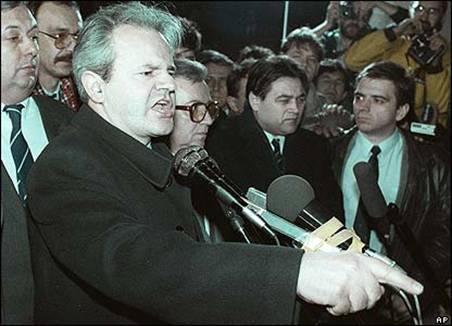
Slobodan Milosevic officially became Serbian president in 1989, in elections widely
regarded as rigged. He abolished Kosovo's autonomy the same year.
An article by Dr. Ichak Adizes
Published in 1999
In July 1991, Mr. Zelenovic, the Prime Minister of Serbia at the time, invited me for consultations on the breakdown of the Yugoslav Federation. I was well known as someone who knew Yugoslavia well. I published two books on Yugoslavia, which were translated to several languages.
When I arrived, I met with a joint session of the cabinet and the leadership in the Parliament of the Socialist party, which was and still is in power. I did an interactive diagnosis of the situation with them.
My conclusion was that the problem was not Slovenia nor Croatia, which were seeking independence (Bosnia was not awaken yet), but that it was Kosovo. It had 2 million Moslems who did not wish to be part of Yugoslavia. With a population plagued by low literacy, high unemployment and high birth rate, the highest in the world with an average of 9 children per family, it was costing Yugoslavia 1.5 billion dollars a year to provide health, education and unemployment benefits.
"How can you keep doing this?" I asked. "While Serbian hospitals have no medicines, you are spending a fortune on Kosovo where people hate you. You yourself say that few years back the Albanians were only 400 000, now they are two million. When will this geometrically expanding wave reach Belgrade? Kosovo is the Serbian gangrene. True, 500 years ago Kosovo was the valley where the Serbian nation was born. OK. I accept your claim that it is the Serbian Jerusalem and one does not give up motherhood's help; but wouldn't you cut your own right arm if it had gangrene or would you let it spread?"
To make a long story short, after a week of debates, Zelenovic thought that I had a point and suggested we go and see Milosevic. It was a meeting of the three of us. No one else. No translators were needed because I speak Serbian fluently, being born there.
To understand what happened next, one has to understand Serb culture. When two people that do not know each other meet, the communication in the beginning is formal, using plural you (Vi). If they seek to become more friendly and intimate, the one with the higher status has to initiate it and the other one has the option to join in. It takes the following form: The higher in status moves to singular you (Ti). If the other person accepts the offered intimacy he moves to use it too. The two will become real friendly and the conversation will become sincere without any "make believes" when the higher in status curses the other person, or better, curses his mother. That is what happened
here. We started with plural you's. I introduced myself. When he heard that I was born in Yugoslavia but raised in Israel he got excited. He considers the Serbs the Jews of the Balkan. "We suffer alike. Everyone wants to annihilate us but we survive in spite of adversity and the bad destiny." He expressed strong desire for Israel and Serbia to renew their diplomatic relations. Then he moved to singular you. I was waiting. The conversation continued and when he said "F'k your mother" I knew we could start talking about Kosovo.
I said: "I understand that Kosovo is the cradle of the Serbian nation. But the Kosovars already said they would win their battle against the Serbs in bed. They are multiplying at a rate you can not ever match. Soon they will be a majority not only in Kosovo but also in Belgrade. It's only a question of time. It is your gangrene."
Milosevic is a very bright person. I have worked intimately with many Prime Ministers and many CEOs of Fortune 100s. You can tell a person whose wheels are turning fast. Milosevic looks at you and you can feel that the guy is intense, a fast thinker and ahead of you.
He turned to Zelenovic and said: "What do you think?" I saw that as an opportunity to dare and say more. "Look Slobo" (I felt I could address him by his nickname after he cursed my mother.) "These 2 million Kosovars are not a fog that one morning we wake up and it is gone. What are you going to do with them? Shoot them all? You can not make them move out of Kosovo either. The world community will not let you do it. They will not allow two million Moslem refugees to be floating somewhere through Europe" Zelenovic agreed with me. "So, what is your suggestion?" Milosevic asked. " I suggest we take advantage of what is dear to the Western society: Self-determination. Let's announce
that we recognize the right of the minorities and different nationalities that comprise Yugoslavia to have self-determination. Let us invite a blue ribbon committee headed by President Carter, who likes these kinds of things, to supervise and observe a national referendum. Those who want to stay in Yugoslavia stay, and those who want to leave, let them separate. The Croats and Slovenes will leave. We lost them anyway. The Serbian in Bosnia will vote to stay and we should do our best to encourage the Kosovars to vote to leave us. The end result will be that we got greater Serbia with no war and we got
rid of the gangrene. It is politically viable in spite of the fact that what brought you to power is the promise to do the opposite: get the Kosovars out and the Serbs in. You can claim that you could not oppose self-determination, which you can make appear through the media which you control as a sacred value. Once the Kosovars are on their own and have to support themselves, they will have to control their reproduction rate. The danger that Albania will join them for a greater Albania is not real because the Albanian leadership
does not want two million Moslems shaking the very delicate balance between the different religions that comprise Albania. They also do not welcome the Kosovo leadership that exhibits an attitude of superiority towards them."
The end of the conversation, which took four hours, was that Zelenovic was given the task of drawing a map of Kosovo. The part called Metohija, where most of the Serbian monasteries are, were supposed to remain in Serbia and the rest was to be let go.
My assignment was to speak with the American ambassador about this deal and get his cooperation. One should not forget that Milosevic himself refused to accept the American ambassador and talk to him. I had a problem now. No one knows me at the State department. I am a nobody there. Who will believe me? Fortunately I had a friend I met through the Young Presidents Organization: Ken Adelman who was the head of the disarmament negotiations for President Reagan and an ambassador to the United Nations. "Ken help," I called him. "Here is what is happening with Milosevic and I need to talk to Ambassador Zimmerman. He does not know me. Make the introductions, please".
The next day when I called the ambassador, I was greeted warmly and when we met I was ushered to a room that appeared secured from electronic eaves dropping. Two young men were sitting there taking notes. I presented what happened the day before with Milosevic. "I do not believe Milosevic," said Zimmerman. "No way” was his conclusion. That is where this initiative died. And come to think Zimmerman might have been right.
I was supposed to meet Milosevic the week after, to deliver Zimmerman's response. I was never asked back.
Poor Zelenovic. He drew maps that Milosevic never asked for. After one week of waiting to see Milosevic I left for South Africa where another assignment was awaiting me. "If anything happens, let me know" I told Zelenovic. The next thing I knew was that Zelenovic got sacked unceremoniously by Milosevic. Insiders in the cabinet, who knew Milosevic intimately, told me that it was because of the affair with me. Zelenovic showed a weakness in his determination on Kosovo.
What Milosevic did was an old Tito trick. "How do you know where the weeds are? You water the garden and wait for them to raise their head. Then you mow them out." That is what Milosevic did. He encouraged me and Zelenovic to tell our true feelings and thoughts. He kept to himself what he really thought and then acted as he thought right. "Uh, I said to myself. This guy is fast and a political genius." And the events thereafter reinforced my judgment.
Milosevic removed all the leadership of the ruling party and put young inexperienced people to lead it. They depended for their political survival on him. Even economically they depended on him. The leaders of the party were people who would starve to death if the party would loose in the elections because they had no profession except being apparatchiks of the party. He had an iron grip on power. After my visit he got Milan Panic, a Serbian immigrant to the United States who even forgot how to speak Serbian and had zero political following to become the Prime Minister of Yugoslavia.
"This whole visit, it occurred to me was a 'job interview'. They were looking for an unknown, but still legitimate face, for Prime Minister and I had blown my opportunity (Thanks God)". That was 1991.
Years passed by and I wondered all these years how in the world was Milosevic going to deal with Kosovo. I have been writing, warning the world about the forthcoming calamity in Kosovo. I had a personal reason to worry too. I was saved by Albanian Moslems during World War II. I felt I had a debt of honor to pay.
Watching the bombing of Yugoslavia on TV, listening to interviews with strategic decision makers like Sandy Berger, the National Security Advisor to President Clinton, I finally realized the morbid genius of Milosevic. Yes!!! He is going to expel the Kosovars out of Kosovo. The two million of them, and he is going to do it with the full cooperation of NATO. How? NATO is in the air only, right? He has a free hand on the ground. Few atrocities will do the trick. A massive exodus will follow. True that in the meantime he will be loosing some airports and several factories because of the raids. He might also loose a few thousand soldiers and civilians but he will clean up the Serbian cradle, something he promised to do when he climbed to power. He will be remembered in the annals of Serbian history as the great liberator. And he can do it under the cover of war. These are war refugees and he is doing it without impunity. How can NATO stop him now? Do more bombing? Of whom? Civilian targets? Bomb Belgrade? It is fine with Milosevic. It will make him an even bigger hero of his nation. He will become the true martyr. Will the Serb people rise against him when the destruction becomes overwhelming? No! It can not be worse than what they experienced in Second World War where every ninth Yugoslav was killed. This nation is used to hardship. They have had a five hundred year long hardship boot camp under the Turks. They will eat grass and leaves and not yield once attacked. Americans yield once they see body bags. Serbs, when hurt, call for revenge and get more hostile, not less. They have been under Turkish influence for a long time. Turks never retreat. Americans think rationally. Serbs think first with their emotions, than they
subordinate their logic to it and if there is no logic, they make it up to fit what they emotionally have decided to do.
Milosevic has played his cards very smart and the West made all the wrong moves. He will clean up Kosovo and the West will end up silently thanking him for it because he removed the Moslem threat of a new Moslem state in Europe. Will they take him to Hague after the war and charge him with crimes against humanity? I doubt it because so far this guy has been more intelligent that any of his counterpart.
- Bookmark :
- Digg
- del.icio.us
- Stumbleupon
- Redit it
What makes a person attractive?
- Posted by - (1) Comment
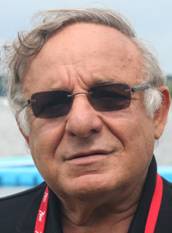
Dr. Ichak Adizes
A blog by Dr. Ichak Adizes
If you ask a man what makes a person attractive, you will get different answers than if you ask a woman.
Men, as I understand, usually focus on physical attributes: the legs, the breasts, etc.
Women tend to focus on the brain and on a man’s ability to support and defend, etc.
I have another idea, which I hope both sexes can agree to. (And if you predict that it has something to do with integration, you’re right.)
When a person has it “all together”––i.e., is integrated––none of their energy is wasted. This person exudes energy, while a person who is “falling apart” takes energy from the people around him or her.
Who is attractive? Those that give you, not take from you, energy.
People who “have it together” are attractive. Those that are “falling apart “ are not.
Years ago, I hired as my assistant a young woman I felt was rather plain and unattractive. On purpose. I assumed that attractive women would distract me from work.
We started working together, and over time I found her to be smart, intelligent, easily receiving and granting respect and trust. I frequently sought her opinion, and respected it: I found her opinions very valuable. I learned a lot. And I trusted her word. If she said something would be done, it was done.
Over time, I stopped noticing her crooked nose or protruding chin. I now thought she was beautiful, and I was hopelessly attracted to her. Unfortunately for me, she was in a committed relationship.
On the other hand, I remember dating a woman who was knockout gorgeous. She had a perfect figure, a face that was hypnotically lovely. She was also well educated and came from a respected family. But I lost interest in her within weeks. My endless enthusiasm ended up in endless disappointment.
What happened?
She had no self-trust or self-respect. She sure was not “together”. And because of that, I believe, she had no trust and respect for others––in this case, for me.
She could not make a decision on her own, and acted totally dependent on me. But when I did make a decision, she did not trust that decision. We had endless debates about what to do and who was right.
This kind of person, often called a “high maintenance person,” has no self-respect and no self-trust. She is not “together,” not integrated. As a result, a lot of her energy is wasted between her ears. She usually looks tired––emotionally tired, not necessarily physically tired. She will tell you in a debate: “Never mind,” or “Fine”––but I came to learn that this only meant the debate was being postponed, not actually resolved.
Although such people can be physically stunning, they often become unattractive to the people they are with––despite being intelligent, highly educated, powerful, and successful.
Being attractive depends on the flow of personal energy, which is a function of physical, emotional, and spiritual integration––in other words, being healthy in body, mind, and spirit.
Now, a personal hypothesis:
It appears that humor needs energy; to be funny requires creativity that consumes energy. Thus, it appears to me that people with a healthy sense of humor are more attractive than those who have none.
My experience is that if you can make a woman genuinely laugh, she will find you attractive. The same goes for men.
What do you think?
Sincerely,
Dr. Ichak Kalderon Adizes
25 Responses to “What Makes a Person Attractive?”
1. Ravi Muddha says:
Dear Sir,
I have gone through the article and respect your perception and personal experiences. Yes, I agree with you that integrity plays a major role in not only building relationships but also maintaining and continuing them for a longer time.
But finally one has look into oneself and integrate with his/her True nature where in we don’t find any differences with the outward world because we become so Self-sufficient and really love ourselves more than any other in this world. Once we can truly love ourselves then we can love anything and anyone in this external world.
Regards,
Ravi
2. KRISHNA says:
Very interesting blog/insight. But I was at a loss to understand how to be more and more integrated as you suggest to be.
3. 123 says:
you have to read the book: men are from mar women are from venus. ![]()
4. 123 says:
it’s not about integration, it’s about same values. You and your first assistant had the same values, that’s why she trusted you. you say that everyone who is integrated trust’s you? and you like everyone who is confident? ![]()
5. Eva Hagi-Niv, Ph.D says:
I read your blog every week and sometimes find it refreshing and educative – like your analysis of ‘a problem’ last week. Thank you. I also agree with your final proposition this time: if you can make the other party laugh – usually and attraction is formed — also (mostly?) because you (the generator) recieve the reaction you seek. Nevertheless,you assume that people crave ‘healthy’ energy. I also would like to assume that, however this is a generalization, both in social and work related relashionship.I have been an organization consultant for 40 years. Mostly in Israel, in all kinds of organizations and communities. I frequently come asross managers that are attracted to ‘yes men’ so that they can feel more powerful, make all the decisions, solve every problem. Unfortunately, the same goes for marital relations as well .
I do not wish to be rude, just honest. If you could add a comment about you basic assumption…
o ichak says:
good point eva. i missed to say attractive physically, sexually.
6. Sebastian M says:
On target!
7. Vlad Burda says:
Ichak, it’s very interesting article. And I really like the way, how you changed your style: From being absolutely sure what you said to in search of truth mode. The last one invite us to discuss! I am also in search and have my own thoughts about the subject.
1.Humour. Women love it. But you must be very careful, not to cross the border to disrespect mode. When you laughing on something including yourself you make the image of yourself bigger then the object of your laugh. You need to keep balance between humour and humility. You do it good in your articles ![]()
2.What men focuse on in women? “the legs, the breasts, etc.”- good, but just if you want receive less then 10% what prepared woman could deliver to you. And if you wrote, that the most important for attractiveness what you could receive from partner not give to him (her) we are approaching to the issue, what you really need from opposite sex in relationships.
I surprised that you nothing said about eyes. The eyes are reflect the deepness of woman and her current state.
What about warmness and charming?
3.The secretary. My experience – male is the best. If she is taking care good about you will be attracted anyway. Doesn’t matter how she looks like. Because care – this is the most important part what we looking for in love relationships. It’s in a certain way substitution of parents care from childhood in a mature mode.
And of course the general thought about being integrated as a whole to be more attractive – is absolutely true!
Whole person has less internal marketing. He (she) has enough, what he(she) needs and ready to give outside.
If you have less internal marketing you could give more to outside client. And our love partner – is the main client in life.
8. guruprasad says:
DEAR ICHAK,
you are absolutely right.You relised it.
Now I la understand wwehy laila and majnu were in deep love. Legend has it that laila was a ugly girl!
I mean physical.It is the energy flow from a person which jells with other which matters that physical beuty attributes.This can be conceptualised !
9. Dion Friedland says:
Dear Ichak, I heard a lecture once from a highly regarded psychologist where he said a sense of humor and the ability to repond with quick responses that made people laugh was a sign of intelligence. Over the years I have found this to be absolutely correct. One of the things that makes people attractive to both sexes is having a sense of humor. It would seem therefore that people are attracted to intelligent people who display their intelligence through humor as opposed to being a “know it all”.
10. Tom says:
I have observed a different phenomenon. When looking at the concept of attractiveness across history and across different cultures we find different descriptions of beauty. For example mona lisa would be considered “fat” today. Many societies consider tanned skin ugly and fair skin beautiful, while in the west we have the opposite perception. Thus I postulate that beauty is more in the eye of the “publisher” than it is in the eye of the beholder. The publishers are the opinion leaders, those that set the standard for beauty in what they place in the public eye. As we are all conformist by nature we conform to this perception of beauty, which is really just fashion. So if “beauty” is as subjective as fashion what then is at the core of attractiveness. If you analyze the different perceptions of beauty across cultures and time you will find 2 common denominators. Wealth and health. (included in health is symmetry) In our culture dark skin means you have time to lay by the pool (wealth). In other cultures light skin means you do not need to work in the fields (wealth)….
11. Kyle says:
Thanks for your ideas and insights.
12. Dion Friedland says:
Ichak, I would like to add that it goes without saying that people who have a positive outlook and are enthusiastic are more attractive to others than those who exude negative energy. People with positive attitudes are generally also higher achievers. This too makes them attractive to others. Having grandchildren, I realize one of the essential things to impress on school leavers is the importance of being positive and enthusiastic about whatever they do and to ensure this positive attitude comes out in the way they speak and smile.
13. Joe White says:
Perhaps, then, Love is for giving. We must first fall in love with ourselves then give that love to others……..if not we will be just taking love energy from others.
14. Citizen John says:
Oh yes. I feel you are correct Dr. Adizes. I go with everything you said except one thing. I think it would take more than weeks to lose interest in the physically attractive but negative-energy woman, under most circumstances. It would surely happen though. Yes, I agree with you.
15. Dragan says:
Number of comments shows how atractive topic this is. Everibody are curious in learning how to be of find atracted/ion.
I would add: there has to be right setup before. If U would not need new secretary… etc etc. Or. how come that you get atracted with person totaly “non-integrated” and it takes few days/week/more to found it out.
BR
Dragan
16. Marko Kiauta says:
Integration means, that “input” was absorbed in what was already there – inside. There is time needed to integrate. If we deal with changes, if we are open for new, it is normaly, that the level of our integration wary. When we go out of box, we at first by definition could not be totaly integrated. But if, we take time to arrange “new”, we will be integrated again.
I believe, that this oscillation is present in every person folowing changes and on the way of growth.
The absence of desintegration can be also a sign of absence of digestion. Everything gous in and out. There is no problem of integration. Person lives on surface!
Thank you Ichak, and all the best to you and all readers
Marko
17. Andrey says:
Dr. Adizes, I agree that integrity makes people attractive, because they are whole, balanced and full of positive energy. Such people Give others all they want without any tention and expectation to receive something back.
On the other hand, disintegrated people need a positive energy from others and use any manipulation to get it. Like a black whole in galaxy. I guess disintegrated people wear a mask and lie. Even themselves. It takes a lot of energy. It based on dismatched values they are declared and real ones. But! They can be attractive as well. Actually, for a very short time. And other people are empty and even seek after communication with them.
18. Branimir Voh says:
Different people are attracted by different things. Why?
Psychology would explain that we are attracted by things which we do not have ourselves.
Philosophy would say that attraction is in the eyes of the seer and not in the object itself.
Both means that we are those who give value that something (or somebody) is attractive or unattractive.
I prefer naturalness instead of attractiveness. Natural attractiveness would be the best.
Attraction is not bad if we are attracted by the right things.
How to avoid unwanted attractions is a relative question.
Actually, do we really want to get rid of them and take the responsibility for ourselves? Or do we prefer to blame the source outside us? It is not easy to stop eating the cake.
Aff.ly,
Branimir
19. Sergii Bystrin says:
Ironically, the more integrated and whole the person become the less he or she will care about outer attractiveness. Energy flow – yes, not sure about personal.
20. Tom Delmonte says:
Very intiguing and I think one that is germane to a significant number of human activities.
I agree the humor plays a significant part in what makes someone attractive because it requires a very good understanding and ease within the context in which a person lives in.
By context I mean understanding the culture, people involved and ease with the subject at hand; In order to make a comment that adds value (smart, clean humor is of value) and at the same time addresses the issue at hand, requires a dexterity of thought that demonstrates a significant amount of skill, and being skilled is something that we all aspire to.
Thanks for the insight.
21. Igor Mironyuk says:
This is absolutely true. Especially i like – when you make somebody sincerely laugh, this person finds you attractive. To me (i am a man) – women’s sincere laugh and smile is the most erotic thing ever.
22. Reuben Ashton says:
Interesting… and again Adizes is wrong, maybe because he thinks American. Americans see women as body parts summing up a body; no wonder silicon dominates the American female body: big tits and the like.
Adizes is missing the whole point of sensuality, that certainly has to do with the female & male bodies, but not as parts and not in that togetherness that is proposed. Sexual attraction is something more sophisticated than the simplistic approach that is being proposed.
23. George Hathaway says:
Your reductionist approach did get a solution, but there is no assurance it is creative or optimal, nor that it has an effective implementation plan. You, of all people, ought to learn about Smart Questions by Nadler and Chandon (Jossey-Bass, 2004). It is the latest iteration of the Breakthrough Thinking methods made popular in the 1990s with the best selling Breakthrough Thinking (Prima Publishing, 1994) and with Creative Solution Finding (Prima Publishing, 1998), both by Nadler and Hibino. All the books contain supporting information about the research that shows the most creative and effective planners, designers, continuous changers, and problem solvers use a different approach than your reductionism.
24. Rajesh Kothari says:
To make this topic more general, I would put it thus.
Why do we find that we are able to get along with them well i.e, we find them attractive; and with some we, for no apparent reason, feel a kind of mild or strong repulsion; and for some people neither attraction/nor repulsion?
Such experiences are easily and properly explained by ‘Karma Theory’ of Hindus. In short, it says that soul is eternal and takes various life forms to undergo effects of its ‘Karma’ (bonds). These bonds are created due to thoughts/deeds/actions when a soul is in a human form.
In any life form, coming together of two or more souls together is never an accident. They come together to undergo effects of bonds. If one has got some good bonds left to be undergone with the other soul then they feel attracted. If they have some bad bonds to be finished (left to be undergone) then they feel repulsion. (Note: This paragraph covers explanation on topic started by Dr Adizes. I would stop here, as this theory requires one more paragraph to explain how to solve life’s problem once and for all.)
- Bookmark :
- Digg
- del.icio.us
- Stumbleupon
- Redit it
- Posted by - (2) Comment
LITHUANIA
A country you may think you know – but do you really?
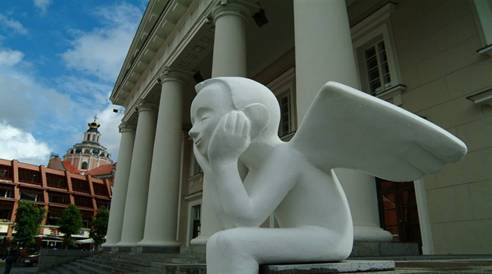
To read more, click on the below links
or search in our VilNews-Google archive above...
|
EUROPE'S LARGEST COUNTR
1. Lithuania was a world super power (1300-1600) – much longer than USA has been – stretching from the Baltic Sea to the Black Sea, considered Europe's largest country by then. |
A HAVEN OF TOLERANCE 2. Gediminas (1275-1341) – founder of Vilnius and the first Grand Duke of the family of Lithuanian rulers during 300 years– made Lithuania a 'haven of tolerance' according to British historian Norman Davies. |
|
STOPPING THE MONGOLS
3. Lithuania (the Grand Duchy) was the country stopping the Golden Hordes (the Mongols) from invading Europe (late 1300s) |
LAST TO BE CHRISTIANISED
4. Lithuania was the last European country to be Christianised (around 1400), and Paganism is still going strong here. Even Christian crosses sometimes contain pagan elements (sun, flowers, grass snakes). |
|
CRIMEAN-TURKIC PEOPLES
5. Karaims – the Turkic-Crimean people who guarded the Grand Dukes – came to Lithuania in 1397 – and the Trakai town (at the castle) near Vilnius is now their world capital. |
JERUSALEM OF THE NORTH
6. Napoleon Bonaparte named Vilnius Jerusalem of the North when he arrived here in 1812. Lithuanian Jews (the Litvaks) had an extraordinary life here for 600 years. |
|
EXCEPTIONAL ITALIAN INFLUENCE
7. Vilnius is the world's most Italian city outside Italy... Lithuania and Italy share a very unique common history. |
LANGUAGE CLOSE TO SANSKRIT
8. The languages Old Sanskrit and Lithuanian are having the same Indo-European roots. Incredible similarities between Indian and Lithuanian cultures since the early civilisations. |
|
NATIONAL REBIRTH 9. Lithuania declared independence in 1918, after 123 years of mostly Russian occupation. The interwar years were very successful and the country prospered immensely. Kaunas was the capital for the period 1919-1940, after Poland occupied Vilnius and southern Lithuania. |
300.000 DEPORTED TO SIBERIA
10. During 1940–1953, some 132.000 Lithuanians were deported to remote areas of the USSR. More than 70% were women and children. 30.000 died there due to climate, hard slave work and starvation. 50.000 were not able to return to Lithuania. During the same period, another 200.000 people were prisoned and 150.000 of them were sent to Siberian Gulags. |
|
HOLOCAUST KILLED 95%
11. The Holocaust in Nazi-occupied Lithuania resulted in the near total destruction of Lithuania's Jewish population. Out of more than 200.000, around 95% were murdered during WWII, the most tragic, worst example of Holocaust in the whole world.
|
PARTISAN WAR 1944-1953
12. 22.000 Lithuanian 'forest brothers' and 70.000 Soviet soldiers were killed in modern Europe's longest and bloodiest guerrilla war, after the Balts withdrew into the woods to organize their powerful armed partisan resistance when the Soviet Union re-occupied the Baltic States in 1944. |
|
SOVIET'S SILICON VALLEY
13. Post-war Lithuania became known as the Soviet Silicon Valley, and also today this country enjoys a very strong research and development sector. Lithuanian world-class specialists cooperate with NASA, NATO, Volvo, Saab, Philips, and many others in the fields of biotechnology, biochemistry, laser optics, chemistry, physics, etc. |
SINGING REVOLUTION
14. The Singing Revolution – that between 1987 and 1991 led to the restoration of the independence of Estonia, Latvia and Lithuania, culminating with the Soviet attack in January 1991 and the Union's fall later same year. In august 1989, two million people joined hands to form a human chain spanning over 600 km (370 mi) across the three Baltic States. |
|
50% LIVE ABROAD
15. Former President Valdas Adamkus was one among the tens of thousands fleeing Lithuania at the end of WWII. Chicago is counted as Lithuania's 2nd largest city, and it is estimated that around one million Lithuanians live in the U.S. A new wave of emigration started in 1991, and one expects that half of all Lithuanians now live outside their home land. |
LITVAKS IN THE WORLD
16. During the 19th and 20th century, hordes of Lithuanian Jews emigrated to the U.S. and South Africa (90% of its 100.000 Jewish population are from Lithuania). Litvaks are today playing leading roles worldwide. |
VILNIUS CATCHES AND CHANGES YOUR SOUL!
Russian writer Daniil Granin

17. Paris has its Eiffel Tower. London its bridges. Rome has the Colosseum. Washington has the White House, and Berlin its Brandenburg Gate. Vilnius has its wonderful, mysterious Old Town with narrow, winding streets, courtyards, cellars, smells, music of all kinds, and the very atmosphere of 700 years development of a Mediterranean-like city far away from mainstream Europe...
- Bookmark :
- Digg
- del.icio.us
- Stumbleupon
- Redit it
- Posted by - (0) Comment
The Travel Magazine:
Spa, romance in the Uzupis and beer.
Vilnius makes for a great weekend away
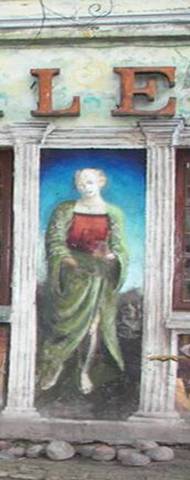
The UMI gallery in
UŽ!upio resPUBLIKA
Photo: Rasa Mekuskaite
If you believed the hype about amber you’d think it was the cure for all ills: heart problems, arthritis, depression, even the plague. I can’t vouch for any of those but I can say that having one’s face massaged with amber powder applied by amber balls is an absolutely delicious experience, like some rather superior form of tickling.
The ‘Gold of the North’ has been fished out of the Baltic Sea and traded for centuries – it was much in demand in Imperial Rome – and here today in Vilnius it is still big business.
There are countless shops, a museum devoted to the subject and a specialist spa which is where I’m about to sample a treatment.
I confess to being a bit of a fidget in some spas and when linen bags are tied round our bare feet and we’re asked to walk in different ways across a layer of small pieces of the fossilised resin – on our toes, on our heels, feet rolled outwards, feet rolled inwards – the familiar combination of mild irritation and self-consciousness begins to creep over me.
But once I’m lying on a bed and the therapist is gently rolling the amber spheres over my skin, pressing here and there, I succumb to the pleasure of the moment. I don’t know whether the ‘negative ions’ or whatever have done their bit: I can’t say I look any different by the end of the session but I certainly feel very contented and serene. And my purse is only lighter by about £15 which is certainly a lot cheaper than buying a piece of jewellery.
There are more elaborate treatments but the 20 minute one I’ve had is just right when time is limited.
We’re only in the Lithuanian capital for two days but because it’s relatively small and compact – certainly in the historic areas – you can fit a lot in. The old city is the major draw, with 1500 buildings one of the finest in Central and Eastern Europe, an UNESCO World Heritage Site of narrow streets, hidden courtyards and an extraordinary mix of architectural styles: classical, gothic, baroque.
Read more at: http://www.thetravelmagazine.net
USEFUL INFO
www.lithuaniatourism.co.uk
www.vilnius-tourism.lt
www.lokys.lt
www.vilniuscitytour.com
www.ambermassage.lt
www.kybynlar.lt
We stayed at www.novotel.com
We flew to Vilnius with Wizzair from Luton (they also fly to Vilnius from Doncaster/Sheffield). Prices from around £42 one way. Find cheap flights to Vilniusfrom other airports.
- Bookmark :
- Digg
- del.icio.us
- Stumbleupon
- Redit it
- Posted by - (0) Comment
The Travel Magazine:
Spa, romance in the Uzupis and beer. Vilnius makes for a great weekend away

The UMI gallery in
UŽ!upio resPUBLIKA
Photo: Rasa Mekuskaite
If you believed the hype about amber you’d think it was the cure for all ills: heart problems, arthritis, depression, even the plague. I can’t vouch for any of those but I can say that having one’s face massaged with amber powder applied by amber balls is an absolutely delicious experience, like some rather superior form of tickling.
The ‘Gold of the North’ has been fished out of the Baltic Sea and traded for centuries – it was much in demand in Imperial Rome – and here today in Vilnius it is still big business.
There are countless shops, a museum devoted to the subject and a specialist spa which is where I’m about to sample a treatment.
I confess to being a bit of a fidget in some spas and when linen bags are tied round our bare feet and we’re asked to walk in different ways across a layer of small pieces of the fossilised resin – on our toes, on our heels, feet rolled outwards, feet rolled inwards – the familiar combination of mild irritation and self-consciousness begins to creep over me.
But once I’m lying on a bed and the therapist is gently rolling the amber spheres over my skin, pressing here and there, I succumb to the pleasure of the moment. I don’t know whether the ‘negative ions’ or whatever have done their bit: I can’t say I look any different by the end of the session but I certainly feel very contented and serene. And my purse is only lighter by about £15 which is certainly a lot cheaper than buying a piece of jewellery.
There are more elaborate treatments but the 20 minute one I’ve had is just right when time is limited.
We’re only in the Lithuanian capital for two days but because it’s relatively small and compact – certainly in the historic areas – you can fit a lot in. The old city is the major draw, with 1500 buildings one of the finest in Central and Eastern Europe, an UNESCO World Heritage Site of narrow streets, hidden courtyards and an extraordinary mix of architectural styles: classical, gothic, baroque.
Read more at: http://www.thetravelmagazine.net
USEFUL INFO
www.lithuaniatourism.co.uk
www.vilnius-tourism.lt
www.lokys.lt
www.vilniuscitytour.com
www.ambermassage.lt
www.kybynlar.lt
We stayed at www.novotel.com
We flew to Vilnius with Wizzair from Luton (they also fly to Vilnius from Doncaster/Sheffield). Prices from around £42 one way. Find cheap flights to Vilniusfrom other airports.
- Bookmark :
- Digg
- del.icio.us
- Stumbleupon
- Redit it
- Posted by - (0) Comment
Comments to the blog:
I will become a resident of Vilnius – again after 17 years abroad
By best-selling writer Andrius Užkalnis

Article ref: https://vilnews.com/?p=6913
![]()
Welcome, Andrius,
and I hope you'll find your luck in Vilnius, especially the place you'll live is miracolous. Don't forget to visit Uzhupis, to have beer with our republic's citizens:),
Yours, Thomas Chepaitis
![]()
Well, good luck. Hope you try to find some way of using what you have learnt abroad to help Lithuania get rid of its Soviet mentality. And hope you keep sharing your thoughts with Vilnews.
Gintautas Kaminskas
![]()
Good luck to you and your family! I wish you to soar smoothly and elegantly and make Lithuanians think and re-think and to look at the things from a different corner and with eyes widely open to the world not only their village called Lithuania.
Good girl
![]()
It seems to me that not only will you enjoy your native culture in the magnificent Vilniaus senamiestis, but you are bringing something valuable back home. You can add to the richness and diversity of a small, but great country which is well-loved by so many of us scattered across the globe.
Jurate Kutkus Burns
![]()
goodbye England's rose...
E_J
![]()
LOL :)))
Goodby English rose, hello Lithuanian thyme... or thorn... or...
Užkalnis forgot to mention, that he has some quite good friend here (Lithuania) also (I'm not talking about me, I mean I just think so, I mean I know that).
Skirtumas
![]()
welcome back :))
niex
![]()
A repatriate is an outsider too, a foreigner at home.
Nomeda Repšytė
- Bookmark :
- Digg
- del.icio.us
- Stumbleupon
- Redit it
VilNews e-magazine is published in Vilnius, Lithuania. Editor-in-Chief: Mr. Aage Myhre. Inquires to the editors: editor@VilNews.com.
Code of Ethics: See Section 2 – about VilNews. VilNews is not responsible for content on external links/web pages.
HOW TO ADVERTISE IN VILNEWS.
All content is copyrighted © 2011. UAB ‘VilNews’.

 Click on the buttons to open and read each of VilNews' 18 sub-sections
Click on the buttons to open and read each of VilNews' 18 sub-sections 





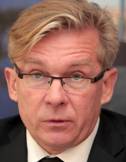



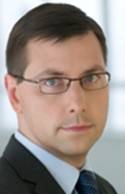
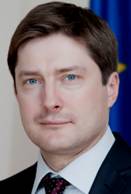
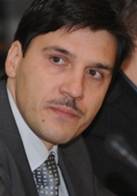
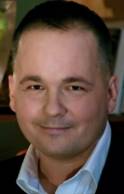
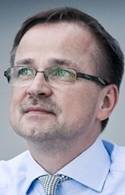
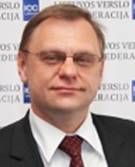
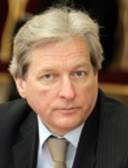








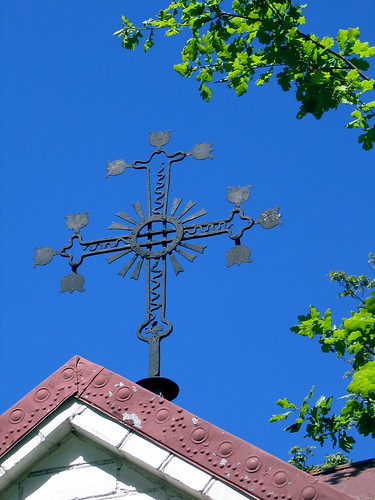

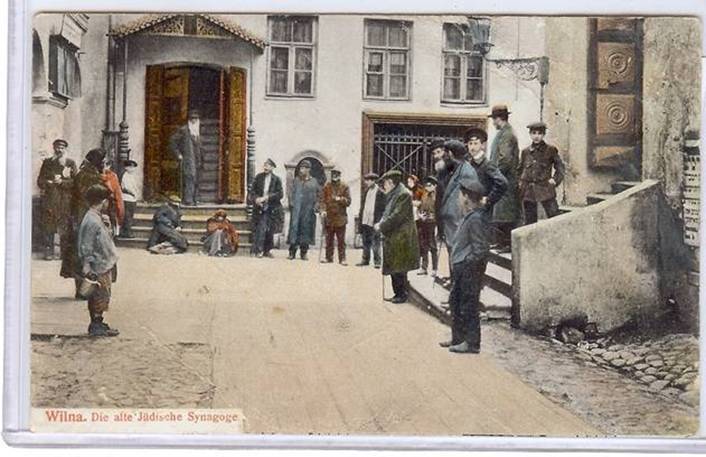


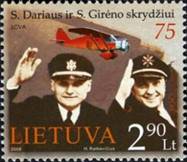





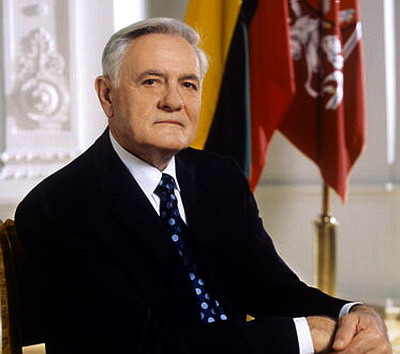
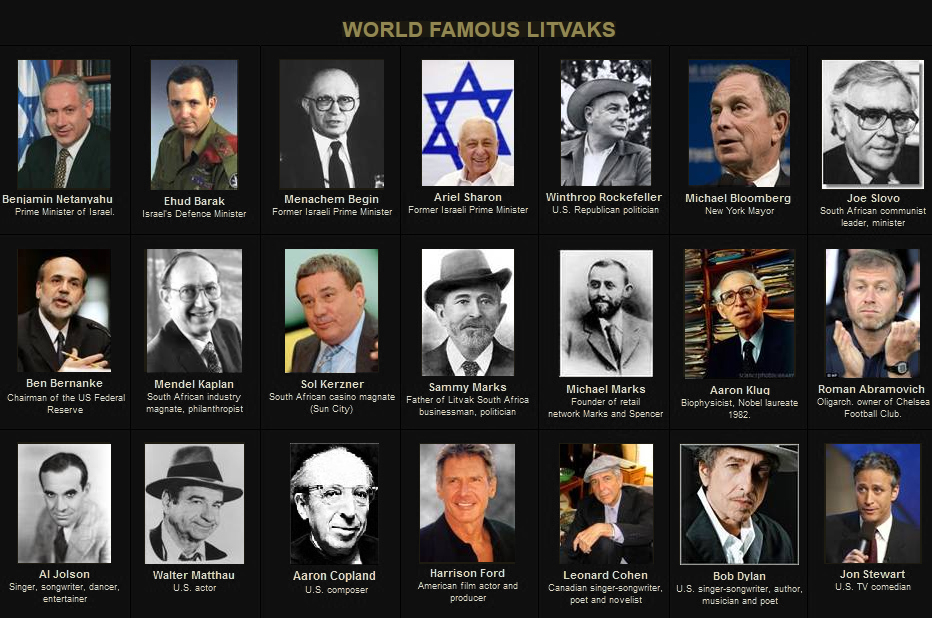









.jpg)



